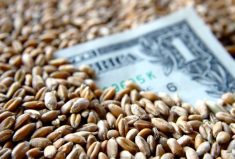Chicago | Reuters — Chicago Board of Trade corn futures fell on Monday for a second straight session on lacklustre export demand and plentiful U.S. supplies as a record-large harvest wound down, traders said.
Soybeans and wheat also declined.
At the CBOT, December corn settled down 5-1/4 cents at $3.67-1/2 per bushel (all figures US$). January soybeans ended down 5-1/4 cents at $10.33-3/4 a bushel and December wheat fell five cents at $5.42-1/4 a bushel.
Corn led the way down in lacklustre trade ahead of the U.S. Thanksgiving holiday on Thursday.
Read Also

U.S. livestock: Cattle futures sink on concerns over Trump’s push to lower prices
Chicago | Reuters – U.S. cattle futures tumbled on Monday, extending a steep slide after President Donald Trump complained last…
“Our corn export demand is lagging year-ago levels, probably not meeting expectations. Wheat is the same,” said Don Roose, president of U.S. Commodities in West Des Moines, Iowa.
Losses were limited by firm domestic cash values amid a slow pace of farmer offerings, a factor that has helped CBOT corn bounce off a five-year low set Oct. 1 near $3.18 a bushel.
“It’s still a supply-driven bear market,” Roose said, “but it’s masked by the fact that the producer is not interested in selling because we are under the cost of production.”
After the CBOT close, the U.S. Department of Agriculture said the U.S. corn harvest was 94 per cent complete, up from 89 per cent last week.
The government has estimated the crop at a record-large 14.4 billion bushels.
Soybeans fell despite the USDA reporting weekly U.S. soybean export inspections at a robust 2.784 million bushels, topping trade expectations.
Market pressure stemmed from plentiful global soy supplies and mostly favorable weather in South America, including beneficial rains expected this week in Brazil.
“U.S. prices should continue to grind lower under the weight of record U.S. production and impending record crops in South America,” Morgan Stanley said in a weekly note on Monday.
“Favourable planting economics has caused increases in soybean acreage in Brazil and Argentina at the expense of corn,” the firm said.
Wheat fell in sympathy with corn and soybeans, despite concerns about poor winter wheat germination in parts of the U.S. and the Black Sea region.
USDA rated 58 per cent of the U.S. winter wheat crop as good to excellent, down from 60 per cent a week earlier.
— Julie Ingwersen is a Reuters correspondent covering crop commodity markets from Chicago. Additional reporting for Reuters by Nigel Hunt in London and Colin Packham in Sydney.
















